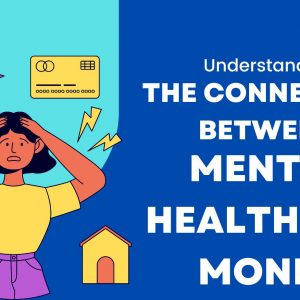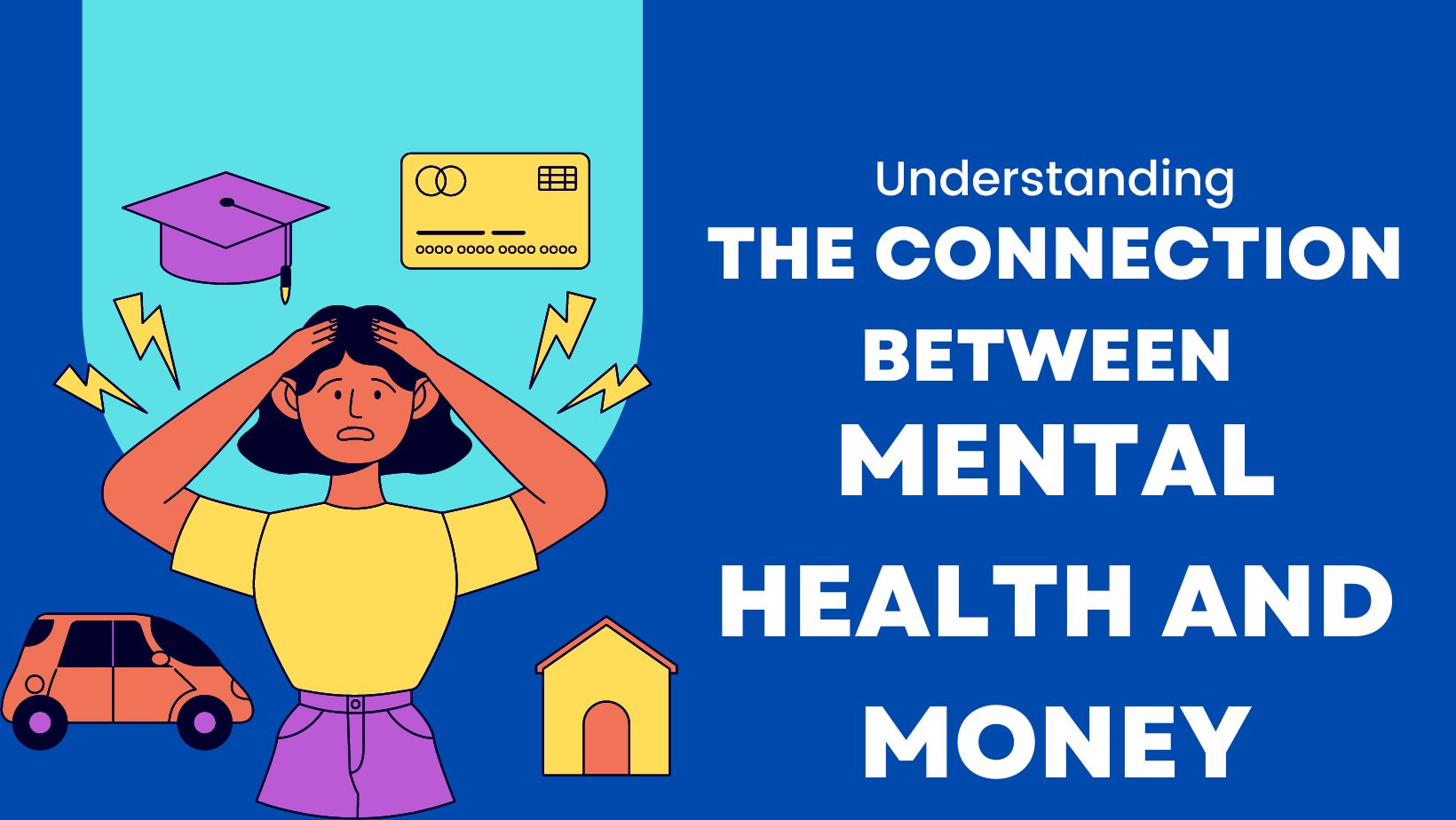
If you’re looking to manage your money but are also worried about your mental health, you’re not alone. Over the past few years, there has been a growing awareness of the connection between money and mental health. This Blog is all about Understanding The Connection Between Mental Health and Money.
In this blog, we’ll talk about financial stress, bipolar disorder, and gambling addiction, and how one can affect the other. We will also cover some simple tips that can help you take control of your money when you have mental health issues.
Understanding financial stress
Financial stress has been linked to poor mental health, leading to sleeplessness and increased substance use. High financial stress can manifest in physical symptoms such as anxiety and headaches. Financial worries have also been associated with poor academic performance and social integrations, psychological health, and later life well-being. Excessive financial strain has been linked to an increased risk of health problems such as self-rated health problems, depressive symptoms, and functional impairment.
Much of the research on financial stress and mental health has focused on the relationship between money problems and depression. In one study using National Health Interview Survey (NHIS) data, financial worries were linked to psychological distress, regardless of socioeconomic status. This correlation was found to be moderated by certain socio-economic characteristics such as education level and income.
Your money management skills may be influenced by mental health.
Financial problems can have a severe impact on mental health. When struggling with money, it can cause stress, which can affect your physical and emotional health. This is because financial problems can make it difficult to manage finances and can lead to feelings of anxiety and depression.
Additionally, money troubles may cause you to make impulsive financial decisions that could hurt your finances or even put your life at risk. If you aren’t able to pay your bills on time, this can cause financial problems and stress. Additionally, financial problems can lead to unhealthy coping mechanisms such as drinking, drugs, or gambling.
These are not healthy ways to handle stress, but they can lead to financial problems and stress in the long term. If you find yourself constantly thinking about money or feeling depressed over finances for an extended period of time, please consult a financial professional for advice and assistance.
Money and bipolar disorder
People with bipolar disorder can experience financial issues, such as unmanageable debt, from their disorder. These issues may stem from the unpredictable nature of financial management during manic episodes.
In order to address money problems caused by mental illness, it’s important to first address the underlying issue. Protecting your finances and staying on top of your financial responsibilities is important for everyone, but it can be especially challenging for those struggling with mental health issues.
Mind and Mental Health & Money Help is one of the institutions which is available to assist anyone experiencing financial difficulties as a result of mental illness. In addition to providing financial support, these organizations aim to improve mental health services by raising awareness about financial issues related to mental health and advocating for policy change.
A growing body of research has revealed the relationship between mental health and finances, highlighting the serious financial impact of mental health problems on individuals and families in both the short-term and long-term. This research highlights how financial problems due to mental health can persist even after treatment has improved an individual’s situation.
Feelings associated with money
Feelings associated with money can vary from guilt for spending or seeking support, fear of looking at your bank balance or speaking to the bank, and shame for needing help.
The financial stress of having bills to pay and not enough money can cause stress and result in unhealthy coping mechanisms, such as drinking, abusing drugs, or gambling.
People who experience financial stress may also have a lack of motivation and difficulty concentrating on other problems. This can lead to issues with mental health, as mental health can affect the way people deal with money, such as a lack of motivation, impulsive spending, and avoidance of looking at bills or bank accounts.
Mental health is vital for maintaining financial well-being and avoiding financial problems in the first place. It’s important to recognize financial stress signs and seek support when needed.
Get to know your financial and emotional cycles.
A money- and mood-conscious lifestyle can help you establish a healthy financial relationship with yourself and your finances. To understand spending patterns and triggers, it’s important to identify your spending habits and triggers. This can include tracking your finances to get a better understanding of how you spend your money.
Research has shown that financial stress can have an adverse effect on mental health, so it’s important to carefully monitor your finances and make small changes to reduce daily expenditure and eliminate impulse spending. By taking these steps, you can lead a money-and-mood-conscious lifestyle and improve your mental health overall.
Overspending when you’re unwell
When you’re unwell, spending money can be a sign of being un-well. People with mental health problems may make impulsive financial decisions that can lead to financial troubles or problems with debt. In particular, people with bipolar disorder or hypomania may do things like spend money on frivolous items, skip meals or miss payments on their credit card debt.
This is because they may experience a brief euphoria when money is available and become preoccupied with money and material items. They may also have problems controlling their spending and end up overspending due to impulsivity. Have a conversation with someone you trust about warning signs of overspending. This can help curb the problem and keep finances stable.
Write down the warning signs so you’re aware of when you are spending too much money and have a plan to curb overspending in the future.
Step Change assisted me in getting out of debt by spending money to make me happy.
When you’re feeling tense, anxious, or sad, it’s natural to want to feel better. It’s critical to be cautious when spending money to do so, though. It may lead to you spending more money than you can afford. Guilt, embarrassment, and rage are all common reactions to overspending. It may also make you stressed and broke financially.
To avoid this problem and keep your finances in order, set limits on how much money you spend each month and make sure you stick to them. Debt charities, such as Citizens Advice, can help with financial issues like debt management and repayment schedules. Individuals will work with them to find cost-effective solutions to their financial and credit challenges.
Gambling and addiction
Gambling and addiction problems are complex and can affect anyone, no matter their age or background. Overspending when you’re unwell can be a symptom of a gambling problem. Gambling can lead to addiction if you start spending money on the casino floor or become obsessed with winning money in games.
Sometimes, gamblers may spend more than they have or take out loans to fund their gambling habit. Addiction problems can also arise if a gambler lied to financial institutions about how much money they were spending on gambling.
Seeking treatment from a professional, such as a psychologist or addiction specialist, is the best way to address problems related to gambling. Your local mental health care provider or medical doctor may also be able to provide resources and assistance for both mental health and financial concerns.
Financial abuse
People with mental health concerns may be prone to overspending. Financial issues such as credit card debt or bank overdrafts are possible outcomes. It can also lead to missed payments and higher interest rates in the area of debt management.
Overspending may also result in poor health, as it can lead to poor financial management or making poor health-related financial decisions. People who overspend may be more likely to experience poor health and higher medical expenses. This can create financial stress and put a strain on family finances.
Warning signs of overspending include feeling a ‘high’ after making a financial decision, having an intense urge to make another purchase, and feeling guilty or ashamed about the decision. To prevent overspending, individuals should tell someone about their financial issues and use tips to help stop overspending, such as creating financial goals or tracking spending.
In addressing financial issues for persons with mental illness, support services play a critical part.
A financial difficulty can be a source of misery for those with mental health problems, making it vital that support services provide access to financial assistance. This can help tackle financial difficulties and make it easier for those with mental health problems to access the support they need.
GPs, social workers, and mental health nurses should proactively ask patients about their finances, as this could help identify potential financial problems and offer advice on how to address them. They could also refer patients to informal mentors or financial assistance programs. Financial assistance can provide a much-needed boost during times of stress and hardship, such as during mental health treatment or when accessing support services.
Mental health treatment is often expensive, but there are options for financial assistance through government subsidies and nonprofit organizations. Services for people with mental health problems should be aware of the issue and offer the support they need.
There are four ways to keep your finances secure and maintain a healthy mind:
- Building a cash reserve and creating a financial plan are key ways to feel financially secure. This will help you manage money more effectively and avoid unnecessary financial stress.
- Start by building a cash reserve of at least 10% of your income, which can help protect you from unexpected expenses and reduce the chance of falling into debt. Besides saving money, setting financial goals can also help you stay motivated and achieve your financial goals faster.
- A goal should be specific, quantifiable, and achievable. It should also be SMART: specific, measurable, attainable, realistic, and timed. Once you have your goals in mind, it’s time to create a financial plan to outline your financial steps and track your progress.
- You can get an accountability partner to help monitor your finances and stay on track with financial goals. Alternatively, you can look into financial assistance for mental health treatment to cover out-of-pocket medical expenses.
Take inventory of your finances
If you are looking to improve your financial health, it’s important to track your expenses and stay within your budget. Developing a spending plan will allow you to track your spending and stay within your budget. Besides, setting up a savings account can help create financial stability and independence.
Besides, mental health fundraising can help with the cost of mental health treatment. To feel financially secure and maintain a positive mental health, it’s important to address any financial worries and reduce stress. This will enable you to prioritize your health and well-being. Besides, taking time to address financial issues can help build financial resilience and improve mental health.
Make a plan—and stick to it
To stay afloat and avoid financial stress, it is essential to make a spending plan for the current financial year. By creating a spending plan, you can ensure that you have enough money to cover your expenses in the near future. It is also vital to seek out free counseling services to help with financial issues, such as creating a budget and communicating with creditors. When creating a financial plan, it’s important to address issues like debt management, downsizing your home, or working overtime. This will help reduce stress and anxiety related to money management.
Additionally, friends and family can help monitor your spending and create a budget. In addition to making a spending plan and seeking out free counseling, mentoring programs offered by financial institutions and non-profits can provide support for managing money.

Create a monthly budget
Maintaining a financial budget and understanding your income and expenses are essential to creating a financial plan that works for you. Creating a budget can help you understand your income and expenses and prioritize your spending. Researching mental health programs offered by the U.S. Social Security Administration (SSA) such as SSI and SSDI can help with mental health issues. Consider the possible economic costs of mental illness, such as lost productivity and out-of-pocket costs for therapy. Additionally, it is important to take into account the potential impact of financial instability on mental health. By taking care of your financial responsibilities, you can ensure that you have the resources necessary to address mental health issues effectively.
Manage your overall stress
Reducing stress can be challenging, but there are a number of healthy habits that can help. For example, getting enough sleep, exercising regularly, and eating a balanced diet can all help reduce stress and improve mental health. Other strategies for reducing stress include utilizing relaxation techniques such as deep breathing or meditation to reduce anxiety. If you are experiencing suicidal thoughts, it is critical to confront the issue directly rather than ignoring it or attempting to deal on your own. Instead, seek assistance from someone.
If you’re feeling overwhelmed with financial issues and are unable to find any good solution, addressing the problem directly may be helpful. This may include making a budget, setting financial goals, learning about credit and debt management, or seeking professional advice. It’s also essential to be mindful of unhealthy coping mechanisms such as overeating or spending too much money and reach out for help if suicidal thoughts begin to arise.
Key takeaways

Financial difficulties can stem from underlying issues such as problem gambling, fraud abuse, or mental health problems. It is important to take control of your finances and manage money troubles effectively to ease stress levels and regain control of life.
If you are experiencing financial stress, consider talking to a financial advisor for advice on how to deal with your finances and tackle money problems. Financial advisors can help you identify money problems and develop a financial plan that will help you reach financial goals and objectives. Mind and mental health charities such as Mind and Mental Health & Money Advice provide information and advice on how to manage debt and money troubles. The resources they provide can help you understand your finances and take control of your finances.
By taking control of your finances, you can reduce the financial impact of mental health issues on your overall well-being.
Frequently Asked Questions

What is money dysmorphia?
Money dysmorphia is an issue that occurs when mental health problems are negatively impacting a person’s financial situation and vice versa. People with money dysmorphia may experience financial stress due to debt, which can lead to depression and cause strain in relationships. This can lead to people ignoring phone calls and bills, which only exacerbates the financial issues they’re facing.
Data has shown that people with mental health issues and debt are more likely to still have debt after 18 months than those without. This indicates that money dysmorphia can be disabling for many people, as it leads to feelings of helplessness and overwhelm—preventing them from achieving financial wellness.
Can debts be written off due to mental illness?
Yes, in certain cases, debts can be written off due to mental illness.
Mental health problems can cause financial difficulties and distress for individuals. Studies show that people with depression and problem debt are 4.2 times more likely to still have depression 18 months later than those without financial difficulty. This suggests that financial difficulty can drastically reduce recovery rates for common mental health conditions.
Furthermore, financial stress can also lead to unhealthy coping mechanisms such as drinking, abusing drugs, or gambling. For those reasons, individuals with mental health problems may be eligible to have their debt written off by a creditor in certain cases. It is important to do your research and find out if you’re eligible.
How does money affect mental health?
Money problems can have a major impact on mental health. Financial issues and debt can lead to depression, anxiety, and even suicidal thoughts in some cases. Research has indicated that those with lower incomes are more likely to experience mental health issues than those with higher incomes.
The stress caused by money problems can also lead to physical and emotional health problems. This stress can disturb sleep patterns and cause headaches, digestive issues, and heart problems. People may also find themselves dealing with financial issues in unhealthy ways, such as making impulsive decisions or avoiding dealing with finances altogether.
The current Covid-19 pandemic has heightened financial insecurity for millions of people, leading to an expected uptick in mental health issues. The uncertainty and instability of losing one's job or being unable to pay the bills can be overwhelming and lead to depression, anxiety, and even suicide.
It is important to recognize the toll money problems can take on mental health, so that individuals facing financial hardships can get the support they need.
Conclusion
The connection between mental health and money is intricate and multifaceted. A mental health problem can have a negative impact on your financial situation, which in turn affects your mental health. If you’re suffering from a mental health problem, it’s important to understand the link between mental health and money. Get an understanding of how your mental health affects your money management skills and manage finances in a way that doesn’t exacerbate your mental health problems or interfere with treatment or other support services. Make use of support services available to help you cope with money issues if you are suffering from stress or a mental health problem.



